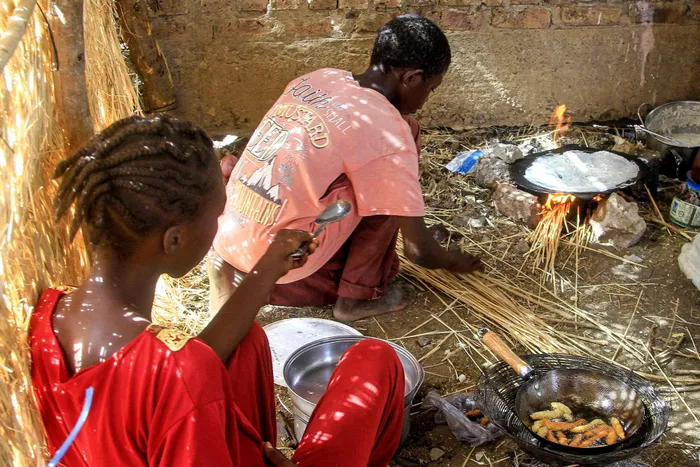Sudan Famine a ‘Shameful Stain on Our Collective Conscience’, says top UN official

A boy prepares straw to be used as a cooking fire inside a hut at a camp for people displaced by conflict in Sudan's eastern Gedaref province on May 15, 2024. ‘Let me be clear: It is still possible to stop this freight train of suffering that is charging through Sudan. But only if we respond with the urgency that this moment demands,’ as many Sudanese civilians 'are literally dying of hunger’. – Edem Wosornu, od the United Nations has said, warning OCHA
By Brett Wilkins
In an urgent appeal for financial and other resources, two top United Nations human rights officials on Tuesday condemned the world’s inadequate response to a nascent famine in Sudan.
The UN Famine Review Committee announced last week that famine now exists in the Zamzam refugee camp near al-Fashir in North Darfur, where hundreds of thousands of displaced Sudanese are sheltering amid 15 months of a civil war that’s displaced more than 10 million people and cut off delivery of desperately needed food and other aid.
Other parts of Sudan — including Greater Darfur, South Kordofan, and Khartoum — are at risk of famine.
“This announcement should stop all of us cold because when famine happens, it means we are too late,” Edem Wosornu, director of the Operations and Advocacy Division at the UN Office for the Co-ordination of Humanitarian Affairs (OCHA), said Tuesday.
“It means we did not do enough. It means we, the international community, have failed,” she added, pointing to the numerous warnings of imminent famine over recent months. “This is an entirely man-made crisis and a shameful stain on our collective conscience.”
Sudan:
— UN News (@UN_News_Centre) August 6, 2024
'A staggering 26 million people are in acute hunger. That's the equivalent of NY, times three, full of starving families and malnourished children.' @UNOCHA's Edem Wosornu tells Security Council at UN Headquarters. https://t.co/QMuoZgpeYT pic.twitter.com/BezZJNoiig
As UN News reported:
The Sudanese National Army and a rival, formerly allied military, known as the Rapid Support Forces (RSF), have been battling since April 2023, pushing “millions of civilians into a quagmire of violence and with it, death, injury, and inhumane suffering treatment”.
A staggering 26 million people are facing acute hunger... More than 10 million people have been forced to flee their homes, including some 726,000 displaced from Sennar state following recent RSF advances.
Sudan’s once vibrant capital, Khartoum, now lies in ruins, the national healthcare system has collapsed, and recent heavy rains in Kassala and North Darfur have increased the risk of cholera and other waterborne diseases. An entire generation of children is missing out on a second straight year of education.
“Let me be clear: It is still possible to stop this freight train of suffering that is charging through Sudan,” Wosornu stressed. “But only if we respond with the urgency that this moment demands.”
Justin Brady, who heads OCHA’s Sudan office, told UN News on Monday that “if we don’t have enough resources and we don’t have enough access, it is going to be very difficult to stop famine conditions from taking hold” in other parts of Sudan.
“Access continues to be a major problem,” he continued. “And some donors have seen that and said, well, we’ll give you funding when you get access.”
The interview as the Head of a @UNOCHA Country Office you never want to have to do. https://t.co/bycH88GGIv
— Justin Brady (@JustinTBrady) August 6, 2024
“Second of all, when we do get access, we need to take advantage of those openings very quickly,” Brady added. “If we don’t, they will close very quickly. So not having enough resources... Our appeal for this year is only a third funded, under $900 million received.”
Echoing Brady, Wosornu said that “we are pushing from every possible angle to stop this catastrophe from getting worse, but we cannot go very far without the access and resources we need”.
Wosornu outlined the humanitarian community’s four key demands:
- Warring parties must end the conflict;
- They must uphold their obligations under international law;
- They must allow rapid, safe, and unimpeded humanitarian access across all possible routes; and
- The international community must provide adequate funding — OCHA is seeking $2.7 billion — to support aid operations.
“Assistance delayed is assistance denied for the many Sudanese civilians who are literally dying of hunger during the time it takes for clearances to come through, permits to be granted, and flood waters to subside,” Wosornu warned.
* Brett Wilkins is a staff writer for Common Dreams.
Related Topics: